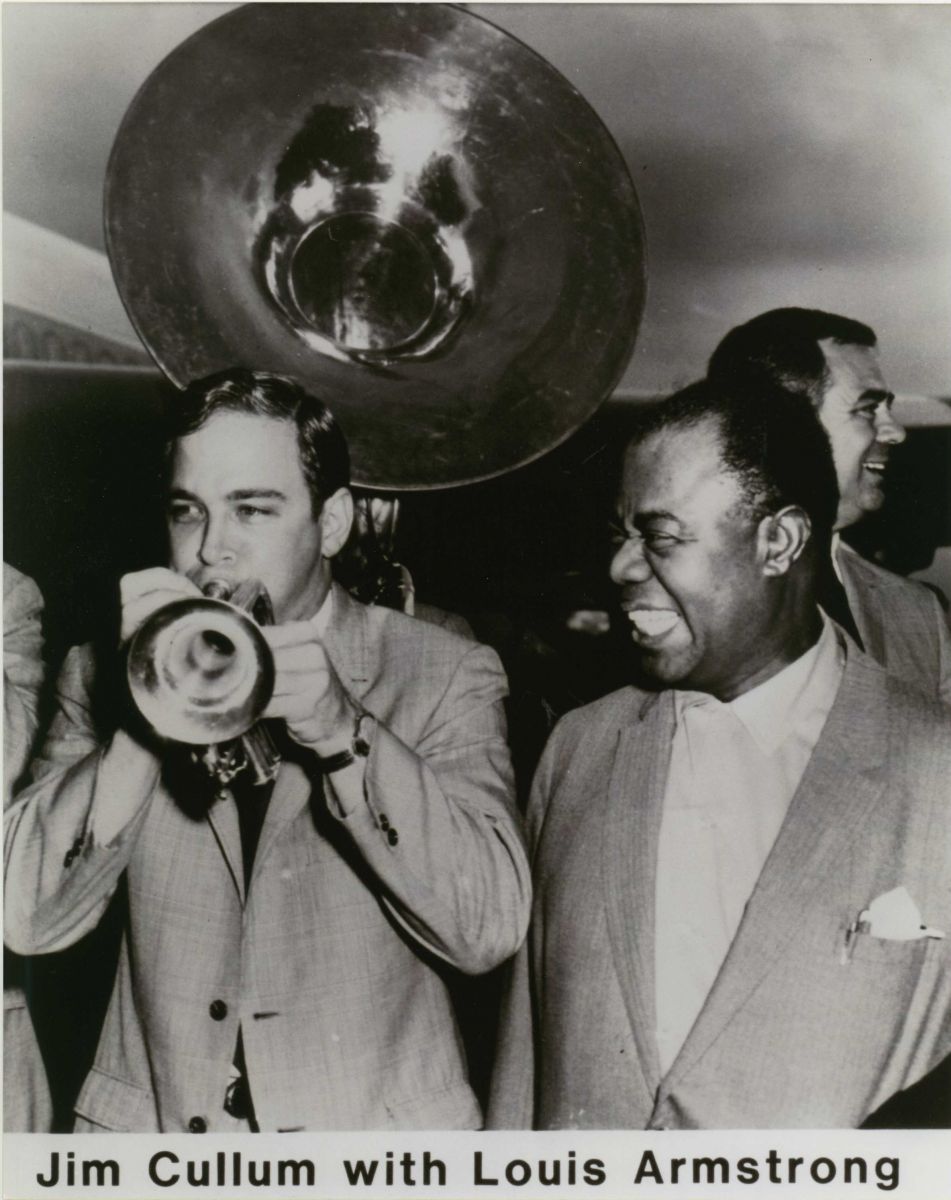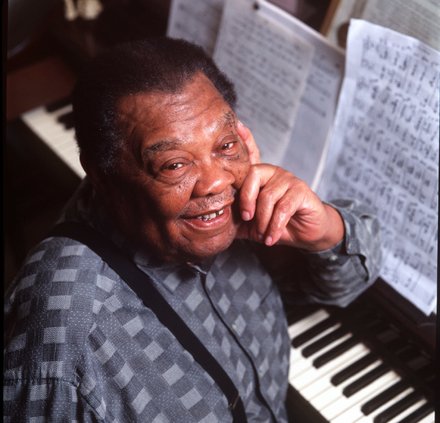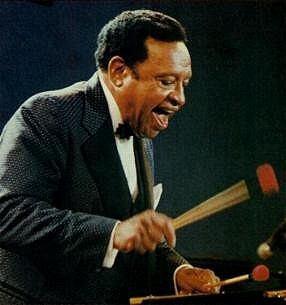
Photo courtesy Jim Cullum.
The jazz world is full of behind-the-scenes stories, and this edition of Riverwalk Jazz offers a collection of some of the best jazz stories we've come across from our guest artists. Whenever jazz musicians get together, you can be sure that sooner or later they'll get around to swapping stories. We've been lucky to capture some great ones on tape. Here we take a look back at our favorites, along with the music that set the scene.
Looking around The Landing Jazz Club, there could be no doubt that Louis Armstrong looms large as a musical hero for Jim Cullum. There's a picture on the wall next to the bandstand with Louis beaming at a young Jim Cullum, who can't quite believe his good fortune.
Jim tells the story about Armstrong’s 1965 visit to San Antonio to play a concert at Trinity University. Assorted dignitaries from the city and university VIPs joined Jim and the Band to greet Louis at the airport. Armstrong made a beeline for the musicians, leaving the VIPs standing alone on the red carpet. Louis invited the 23-year-old Jim Cullum to ride with him to his hotel. Along the way, the great man shared some of his secrets with the star struck young cornetist, including his advice that "if you don't use some kind of salve, your lip's gonna split open like pig’s foot!" Jim Cullum salutes his hero with his rendition of the Armstrong classic “Potato Head Blues.”

Jay McShann. Photo courtesy of the artist.
Kansas City piano man Jay McShann tells the story of how he came to be tagged with his nickname "Hootie." Like many young musicians starting out, McShann made the rounds "sitting in" with all the bands in K.C. One night, the band was sharing a new beverage concocted by the bartender. When a frosty glass made its way to Jay, he couldn't turn it down. But when the time came for him to play, Jay couldn't get out of his seat. Having fun at Jay's expense, the older band members teased, "Well, looka here, this cat come down here to play and got hisself hoot." The name stuck, and he was "Hootie" from then on. Jay performs his original tune, "Hootie's Ignorant Oil," a cautionary tale about the transforming power of drink.

Clark Terry. Photo courtesy of the artist.
Trumpeter Clark Terry shares a personal story about his life on the road, sharing a room with Count Basie. "A funny thing is that Basie couldn't possibly sleep with the light out, and I couldn't sleep with the light on. So, I had to figure out a strategy as to how I was gonna get some rest that night. I knew Basie loved comic books, so this particular night as he lay down on the bed, reading comics, I turned my face to the wall as though I were sleeping. I faked a few snores. Once I heard the comic book flop down on his belly I knew he had fallen asleep. That was my cue to get up very quietly and turn out the light. The thing is earlier we had both unloaded the contents of our pockets onto the dresser. As soon as I pulled the chain to turn off the light, Basie jumped straight up in bed and said 'Put it back!' To this day, I don't know whether he meant the light —or thought I had absconded with his belongings." Clark performs a number from his years with the Count Basie Band called, “Lil’ Darlin.’”

Lionel Hampton. Photo courtesy of the artist.
Lionel Hampton recalls his first meeting with Benny Goodman playing a gig at a California nightclub that catered to servicemen in the 40s. Hampton was wailing away on the vibes when he heard the sounds of three men coming up on the bandstand. Little did he know it was Benny Goodman, Gene Krupa and Teddy Wilson —until he heard the unmistakable sound of Goodman’s clarinet in his ear. They jammed for two hours straight; then Benny suggested they record the next morning. The resulting records—"Moon Glow" and "Dinah"—turned out to be hits, and Hamp had a job with the Benny Goodman Orchestra at the Pennsylvania Hotel in New York City. Here Lionel Hampton performs his classic “7 Come 11” with members of the Cullum Band.
Hampton says of his work with Goodman, "That was the first time they had racial integration in any performance, in the music business, baseball, basketball, anything—it was the first time that blacks and whites played together in public. It was really a wonderful occasion, and it was well received. Gee whiz, I just couldn't have met a better guy in the world than Benny Goodman."

Carol Woods. Photo courtesy of the artist.
Broadway and film actress Carol Woods joins us to portray vocalist Peggy Lee in her own words. "When my recording of 'Fever' came out, I really did have a recurring fever, and I had to go to bed to sweat it out. I asked my doctor what to tell the press, and he said 'Tell them you have mononucleosis, no one will know what that is.' Oh yeah? Well, the next thing that I knew, a wire story went out saying, 'Peggy Lee has the kissing disease, she has the fever from kissing too much!'"
Joe Venuti is known as the first star jazz violinist, but he will always be remembered as the greatest practical joker in jazz history. Guests Andy Stein and Vince Giordano share their favorite Venuti stories, like the classic where Venuti called up 30 bass players and told them all he had a gig for them in Manhattan. "He said to meet him on the corner of 52nd and Broadway, so they lugged their basses to the rendezvous. Thirty puzzled bass players were standing around when Venuti drove by in a cab and gave them the raspberry out the window." Vince adds, "The musicians’ union found out and made Venuti pay all those bass players. I guess the joke was on him after all." Venuti’s “4 String Joe” is one of the tunes Andy Stein tackles in tribute to the ‘wild fiddler from Philly.’
Our show concludes with an historical clip from the Dick Cavett television show of Joe Venuti himself telling a story about traveling with Jazz Age cornetist Bix Biederbecke. Venuti and Biederbecke were on a train called the Old Gold Special, traveling with the Paul Whiteman Orchestra. On a jaunt through the Southwest desert, the conductor warned everyone on board to close their windows because a heavy sandstorm was expected that night. Bix had fallen asleep, as usual, inebriated in his stateroom. Venuti gathered all 64 fire-prevention sand buckets from throughout the train and poured them into Bix's compartment.
The next morning, Bix joined the other musicians for breakfast, still brushing sand out of his hair, and said, "That was the heaviest sandstorm I've ever seen!"
Photo credit for Home Page image: Jay McShann. Photo courtesy of the artist.
Text based on Riverwalk Jazz script by Margaret Moos Pick © 1994

